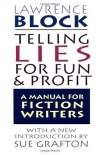Manual For Fiction Writers by Block, Lawrence (classic books to read .TXT) 📗

Book online «Manual For Fiction Writers by Block, Lawrence (classic books to read .TXT) 📗». Author Block, Lawrence
Finally, I allow myself to make occasional use of that old reliable copout?i.e., that writers are really working twenty-four hours a day. Because in certain respects it's undeniably true. Just the other day, for example, I did my daily quota of pages in the morning, spent the afternoon in the gym lifting heavy objects, and then wandered around for an hour or so. In the course of my wandering I watched a car enter an apartment building's underground garage, and it suddenly occurred to me how Bernie Rhodenbarr could get into an otherwise impregnable apartment building by first locking himself in an automobile trunk.
Will I ever use that little bit of business? I probably will, as it happens, but almost every walk I take produces some comparable bit of woolgathering, and most of the wool I gather never gets spun into a yarn. Is it work? And does it matter if it is or not?
Points to ponder, and I leave you to ponder them. For my part, I've spent a shade over three hours writing this chapter, and I'm done now. I think I'll give myself permission to enjoy the rest of the day.
CHAPTER 14
The Carrot and the Stick
SO YOU'RE a writer, she said, spearing a cocktail frank. You know, I'd love to be a writer, but I know it's impossible. I lack the discipline.
I suppose I could have offered to supply the missing ingredient, perhaps by lashing her nude to a desk chair and flogging her with a flail, but I only muttered something inoffensive and went off in search of the stuffed grape leaves. Because everybody would love to be a writer, and everybody lacks the discipline, and it's a good thing, because the profession is crowded enough as it is.
Imagine, for instance, if every dreamer with an urge to see his byline on a book jacket actually went so far as to roll a sheet of paper into his typewriter and start filling it up with words. Imagine, further, if all the people who started novels had the effrontery to finish the bloody things. Imagine if everybody with an itch and an idea took the trouble to turn the idea into a plot, and then sat down and wrote the story.
Why, we'd be up to our nostrils in literature, for heaven's sake! Forget the trees that would be pulped to facilitate such a gush of literary productivity. Think instead of the editors who would be the recipients of it all. They all have too much to read as it is, and it takes forever to get an answer from them, and just consider how much worse the situation would be if their daily reading load were increased by a factor of ten or twenty or two hundred.
You lack the discipline to write, sir?
Well, good for you. Stick with it.
Ah, but for you, Gentle Reader, the situation is rather a different matter. You, let it be said, are a writer, not a bore at a cocktail party or some similar sort of ship passing in the night. The last thing I want to do is discourage you from putting words on paper. You, clearly, are Serious About Your Work. Haven't you purchased this book? Are you not reading this very page? If that's not a commitment to one's art, a dedication to one's craft, whatever is?
It's my belief that self-discipline is a problem for the vast majority of writers, however productive and successful they may be. In order to get his work done, the writer has to be every bit as much of a self-starter as the chap they're always looking for in those ads for door-to-door widget salesmen. He doesn't even have the advantage of an early morning pep talk from the divisional sales manager. He has to supply all his motivation himself. Ultimately, he has to tempt with the carrot and swat with the stick?and at the same time he's the poor old donkey pulling the cart.
Novelists are especially assumed to require a full measure of self-discipline, and for good reason. It takes a lot of hard work over an extended period of time merely to complete a book-length work of fiction. A poem can be dashed off in a matter of minutes. A short story can be hammered out at a single sitting. In both cases, inspiration can carry the writer through the completion of the work.
This is simply not true with the novel. Inspiration alone will not get the thing written, any more than sheer speed will carry anyone to the finish line in a marathon. To continue the analogy, a novelist, like





Comments (0)